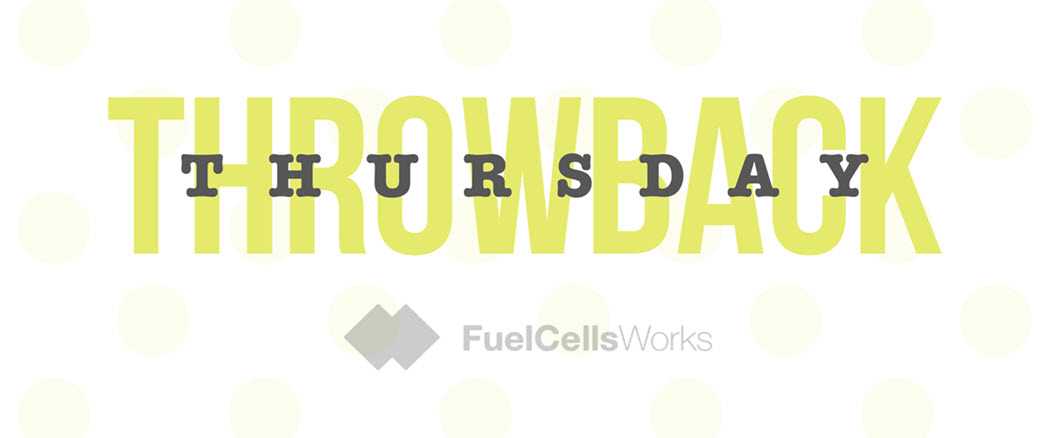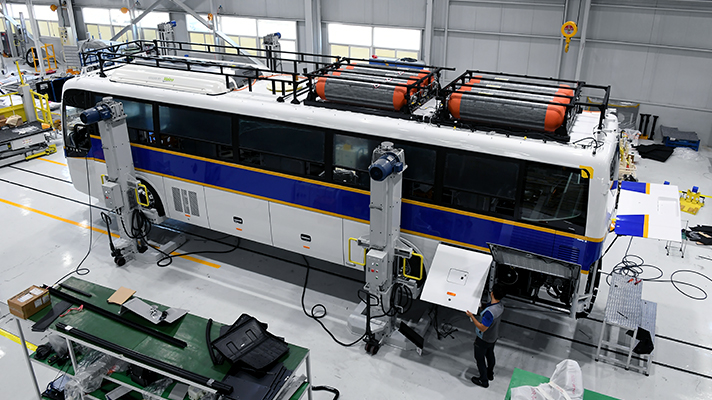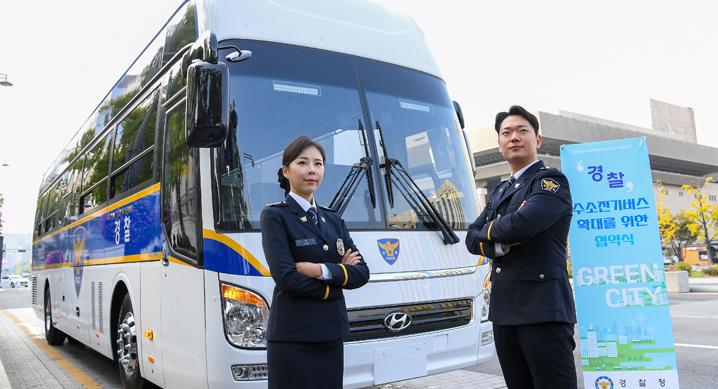
Hyundai Motor unveiled a high-speed police hydrogen-electric bus that will be in charge of Korean police transportation.
Although Hyundai Motor has introduced a low-floor police hydrogen-electric bus based on city buses, it is the first time that a high-speed type bus-class police hydrogen-electric bus has been released that suits the characteristics of the police bus, such as the number of passengers and the cargo (police equipment) it can hold.

The use of air-conditioning devices in the bus will help to reduce occupant fatigue and improve air quality if the police buses, which are inevitable for idling in the city, are replaced by pollution-free hydrogen electric buses with less vibration and no emissions.

Hyundai Motor Company unveiled a high-speed police hydrogen-electric bus on the 31st, with Prime Minister Lee Nak-yeon, Deputy Minister of Commerce, Industry and Energy, Chung Gap-ryong, Deputy Minister of Public Affairs and Environment Chung Bok-young, and President of Hyundai Motor Company, Gong Young-un in front of the Korean History Museum near Gwanghwamun, Seoul. It also signed an agreement to expand the development of police hydrogen buses.
The high-speed police hydrogen-electric bus, which Hyundai Motors unveiled, was developed by mounting a hydrogen fuel cell system on an existing universe-based police bus. It can accommodate 29 people, including drivers, and features a solid type with a high body floor to suit domestic road conditions and high-speed driving.

Two 95kW stacks for the NEXO Hydrogen Electric Vehicle were applied, and a commercial hydrogen tank was mounted on the roof of the vehicle to secure sufficient cargo compartment capacity.
Hyundai plans to provide two high-speed police hydrogen buses to the National Police Agency by the end of the year and start mass production by 2021 after conducting a demonstration project with the National Police Agency by the end of next year.
An official of Hyundai Motor said, “We will continue to improve performance until mass production based on the vehicle data to be obtained through the demonstration project.” “We are capable of developing the best police bus considering the various characteristics of the police bus with high waiting time in the city. ”
The Ministry of Trade, Industry and Energy, the Ministry of Environment, the National Police Agency and Hyundai Motor Company also signed an MOU on Mutual Cooperation to Promote Police Hydrogen Buses.
According to the MOU
- The National Police Agency will promote the hydrogen bus demonstration project smoothly by 2020 and make efforts to convert all police buses to hydrogen after 2021.
- The Ministry of Environment is in charge of disseminating hydrogen fuel stations and supporting linkages for the smooth operation of police hydrogen buses.
- Hyundai Motor will promote the development, demonstration, and production of police hydrogen buses.
The government plans to replace 802 police buses with hydrogen-electric buses by 2028.

Police buses often idle during stops due to air conditioning and heating, and many have said that they should be replaced with eco-friendly buses. Hydrogen electric buses do not emit any harmful gases and have an additional air purification effect.
Generally, one hydrogen-electric bus runs 1km, and 4.863kg of air can be purified. Assuming a hydrogen-electric bus traveling 86,000 kilometers per year, a total of 418,000,218 kg of air can be cleaned, which is equivalent to about 76 adults (64 kg) who breathing clean air for one year.
In particular, police buses may have a greater air purification effect due to the high waiting time on the side of city streets.
The government plans to supply 2.9 million hydrogen-electric vehicles by 2040, while hydrogen electric buses will supply 2000 vehicles by 2022, 20,000 by 2030, and 40,000 by 2040.
The center plans to build a total of 310 hydrogen stations by 2022, including building at least 60 bus-only hydrogen stations by 2022.
In addition, the government plans to review the mitigation criteria for bus transportation business to expand the introduction of hydrogen-electric buses, and conduct research on reforming the fuel subsidy system to expand eco-friendly vehicles for projects such as hydrogen electric buses.
Hyundai Motors is also conducting various hydrogen mobility projects at home and abroad to expand its global leadership in the passenger electric vehicle.
Hyundai is stepping up efforts in the European eco-friendly commercial vehicle market and by 2025 Hyundai will be supplying 1600 hydrogen-electric trucks to Switzerland.
Read the most up to date Fuel Cell and Hydrogen Industry news at FuelCellsWorks




